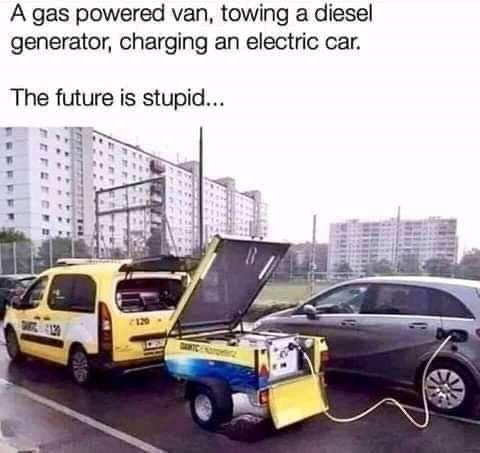How Much Does It Cost to Charge an Electric Vehicle? (A comparison at home and on the road, with gasoline)::Few people know what a kilowatt-hour costs them, so they don’t realize how cheap EV home charging is versus gasoline. On the road, it’s more complicated.
$0.058 / kWh at home for me.
About $0.115 at my friend’s house.
About $0.25 at some public chargers.
Those are amazing prices.
In Germany I pay:
-0.33$ at home and work
-0.72$ - 0.88$ on public chargers
Gas is currently about 7.68$ per gallon. ._.
Those are amazing prices
Right?!? Wildly jealous of those low electricity prices. I’m also in the EU and paying 46.6c (euro) / around 50c US at home.
46 cent per kWH is insane for home prices the fuck.
Tesla super chargers are €0,36 per kWh
Yeah, the quoted $40 fillup is in Hawaii where everything is expensive.
deleted by creator
What area? I live in the PNW. Need to know where to avoid 😂
deleted by creator
deleted by creator
$5-$6 USD
deleted by creator
Some UK prices for comparison:
At home within the EV charging window with Octopus I pay 9p a kwh, outside that window its just over 29p, so I never charge outside the window. I also run my dishwasher, washing machine and anything else I can during that window, typically excluding my EV charging (we are a 3 EV household as both my kids have EVs), we have about a quarter of our electric usage during the cheap window.
Typical cost outside the home for a charger up to 22kw is about 45p a kwh, rising to 75p a kw for ultra rapid pushing out a couple of hundred kws. Its pretty normal in the UK to pay more for a faster charger.
Some places still have free charging but these are drying up, and typically they are limited to a couple of hours of charging at 3 to 7kw.
Petrol is 155.5p a liter, or about £7.06 a (UK) gallon. A modern ICE than is a similar size to my EV should be getting around 50mpg, so 14.12p per mile. 70mpg is possible out of a modern self charging hybrid, this is about 10p a mile. Plug in hybrids potentially offer the same battery power only for 100% of the journey that a full EV offers in the UK for the majority of journeys, as the UK average distance is about 8.5 miles.
Worth pointing out that petrol on a motorway service station (where you will mostly be charging your EV on a long journey) jumps from 155.5p to 177.86p. This increases the cost per mile for the 50mpg example to 16.14p.
My EV gets 4.5 miles per kwh in the summer so about 2p a mile, when its properly cold in the winter than drops to about 3.5 miles per kwh or 2.57p per mile. Assuming an ultra rapid charger at 75p a kwh, cost rises to 16.67p for summer, and 21.42p for winter. Obviously you only charge what you actually need to complete your journey at that price, not fill it up to 100%.
Assuming an equal cost to own and run (which is not the same as purchase price) EVs are significantly cheaper in the UK if you charge at home. If you cannot charge at home then I would look into a provider like Shell installing an on street charger in a lamppost or not bothering at this point if you are motivated by cost.
That’s really useful information. Thanks for taking the time.
How does the process of requesting a street charger work, wouldn’t that require council approval or some such?
As its street furniture it will, like the approval to hook up a charger to the grid, which all fixed (home) chargers need in the UK, it should be handled by the installer for you. As there are as many NIMBY councils you have a non zero chance of it being approved or not approved, there are councils will reject solar panel installs for example.
deleted by creator
This should happen, as in, I expect it to.
Similarly how nearly all gas stations in a given region obtain gas at similar costs from, often, the same distributors, they really only profit from the higher margins on food, etc. in the attached store. If we don’t end up with many more dedicated charging locations like Buccees in the next decade, I’ll be very surprised.
In Europe we’ve had the CCS2 standard for ages, yet charging at different brands is still a fucking jungle when it comes to pricing. Every company seems to insist that charging your EV should be a subscription service, and if you want to use their chargers without a subscription they screw you over with insane pricing like 1.5€/kWh. This trend of everything “as a service” is the bane of modern existence and should be banned.
There are a few similar things with “subscription discounts” on the CCS companies trying to stabilize income in the states.
Granted, charging installations are expensive as hell, and simple prices per kWh with regional electricity rates being all over the place truly isn’t a sustainable model.
Tesla’s infrastructure rollouts were certainly working as a loss leader because they had the cash to get it done, and subsequently ‘won’ in North America because any other charging experience outside of Tesla is awful. Other private startups just don’t have the resources to eat up-front costs, and I guess subscriptions are the easy way out, but just as you saying, they utterly suck for the consumer.
That’s why I think gigantic installs with mall-like facilities with higher-margin food/drinks and other amenities to kill time ala Buccees is where most will end up in the states. There is a similar, and much more elegant, setup in Germany with the “Sortimo Innovationspark” between Stuttgart and Munich I’ve seen in some videos.
deleted by creator
here, use mine, a bigger one

deleted by creator
deleted by creator
I agree, but I still get a hard-on for the electric Hummer. Not because of the way it looks, but because of all the crazy shit it can do like crab walk and the huge ass battery it has. It’s actually a pretty amazing piece of tech.
-Bolt owner
19 cents/kwh at home, and that includes all fees and taxes. The most expensive charge I did was at a Petro Canada, which was 53 cents a minute. I was just topping up so the 20 minutes I was there came to a whopping 91 cents/kwh. There’s a lot of free fast chargers where I am too.
I appreciate the plain English for the mixed bag it is for apartment dwellers.
Can we have electricity? No, we have electricity at home!
I got it how to charge at home or ok the road, but how with gasoline ?
Fill a generator with gasoline. Plug the car into the generator.

deleted by creator
A completely typical situation, and not at all used to try to derail change.
This summer, at Electrify America in Erie PA, I recently paid $0.35 / kWh. And at Electrify Canada in Hamilton ON, I paid $0.57 CAD / min, which is $0.23 CAD / kWh at 150 kW.
This is roughly on par with the cost of gasoline, per mile. I assume the margins are pretty thick for Electrify, because household electricity costs less than a third of that.
For example, say it costs $0.35 / kWh. At 3.5 miles / kWh, that’s $0.10 / mile.
For comparison, say gas costs $3.50 / gallon. At 30 miles / gallon, that’s $0.12 / mile.
I’ve got a small 3kw solar system with about 9kwh of battery storage and that manages about 90% of our yearly charging. Otherwise in nz I pay about 10(US) cents per kWh from 11pm-7am (about 20 cents in daytime) for my charging at home. Public chargers are generally around 40 cents /kWh but range from 50-200kw so can dump power in pretty fast (although my car maxes out at 50kw for charging).
deleted by creator
yeah but thats mpg is typically highway miles, not counting for idling in traffick, which if you are hopping around town doing your chores and shopping and what have your super efficient highway MPG isnt going to be nearly as relevant, and will consume a alot more gas.
Which makes electric, even charging off a tier 1 plugin charger, more viable I think, from a fuel perspective.
deleted by creator
Even plugging into a normal 110V at home makes a difference.
The biggest thing people forget about EVs vs ICE is that you almost never leave home without a full tank.
deleted by creator
I mean it is, cause everything I’ve seen says that fuel costs can be double to 4x what the power costs are for recharging for an average EV… Which, if you have a 2000 per year gas bill, will see a very significant reduction.
especially if you do a lot of stop and go driving, or short range trips (to and back from work, store, school, etc), where you’ll be guzzling gas far quicker than on perfect highway conditions.
Hell, with stuff like A Better Route Planner, long range trips aint to hard either.
Technology Connections and Aging Wheels did a long roadtrip a few months back in an EV and did a series of videos about it.
EV home charging is cheap, but it costs us the environement: using utility electricity generated from
coalnon renewables sources (fossil, nuclear) plants (so is supercharging)Gasoline comes from oil. Electricity comes from coal. Or oil. Or natural gas. Or nuclear. Or hydro. Or wind. Or solar. Or hamsters running on wheels. The renewable options are there and they’re only becoming more prevalent.
Also, power plants scale much better at producing large amounts of energy more efficiently than a bunch of tiny little engines make a car go. So sure, coal plays a part in feeding an electric car, but if you’re going to advocate against it anyway you’re missing the bigger picture.
If there are any hamsterologists here I’d very much like to see the math on hamster charging of EVs please
i ll edit my comment to ‘fossil and non renewables (nuclear)’ instead of ‘coal’. if u check my comment history, i am really just parroting the same idea for a while now, and decided to choose the word coal, albeit inaccurate, just to get my point through…
So you realise that you’re parroting the same thing all over the place and you know it’s probably not accurate? Here’s a challenge for you - approach this topic like something you’ve not researched before without your existing opinions and try and reach an answer as to whether electric cars are better or worse for the environment by being as scientific and objective as possible.
Because I keep coming across comments similar to yours, I have taken that same challenge myself to make sure I’m on the right track and there was a lack of compelling sources suggesting that electric cars are worse for the environment.
I invite everyone with the alternative view to the same challenge.
I have seen your comments before. They show you lack a basic understanding of EV charging and when you get called out over basic points like “most people don’t need to charge their full battery capacity every night” you ignore it.
At least you made this reply.
:/
If only it were possible to generate power without burning coal.
EV home charging is cheap, but it costs us the environement: using utility electricity generated from coal plants (so is supercharging)
Only 8 states in the USA still generate the majority of the their electricity from coal. Its none of the big populated ones.
Coal use continues to decline in the USA while renewables continue to increase:

the rest is whether: nuclear, or fossil, which all are finite and non renewables. only a small fraction are renewables
Not true. Near 50% for CA. One of the largest stars in the USA.
2022, renewable resources, including hydroelectric power and small-scale, customer-sited solar power, accounted for 49% of California’s in-state electricity generation. Natural gas fueled another 42%. Nuclear power supplied almost all the rest.
The world doesn’t revolve only around CA. what about the rest of the world, where EVs are used ?
Well here’s the data for my country:
According to official data, Scotland broke previous records by generating 35.3TWh of renewable electricity in 2022, marking a 28.1% increase from 2021 and 9.8% from 2020.
This amount of electricity could power all households in Scotland for over three years.
Link ?
Do you understand how much effort you’re putting into being “right” rather than having an actual discussion?
For context, you started with “EV is bad because it uses coal”, implying that it is worse than ICE vehicles (somehow).
Then you had to change it to “EV is bad because it uses non-renewable energy.”
Then you had to change it to “EV is bad because it uses non-renewable energy and renewable energy, but not really much renewable energy.”
Then you had to change it to “EV is bad because outside of California, which doesn’t count (for some reason), it uses non-renewable energy and renewable energy, but not really much renewable energy.”
Now that someone is pointing out that other places besides California use significant amounts of renewable energy, your argument has become “I only will accept arguments that provide citations, even though my own various, shifting arguments, have provided none.”
This is in no way a good look for you.
Give us a chart instead.
The gas you burn in a car is 100% carbon-based. The energy in your home is usually not. It’s a mix of carbon-based and renewables. Also, your local coal plant is much more energy-efficient than your engine which probably hasn’t been tuned up in years.
Even if you have an EV charging on a shitty coal power plant, it’s still vastly more efficient than putting a small, personal power plant in a car and carrying around gasoline to burn. A modern EV uses the equivalent of about 3 gallons of gas to go 300 miles.
And has a lot more torque, is quieter, doesn’t need to turn off, etc. It amazes me how much resistance there is to EVs when they’re superior in a lot of ways. Not all, but they’re making huge strides quickly.
Personally, I can’t wait to see the end of big oil’s iron grip on transportation. They’ve lied to us all for decades and gotten away with it for far too long. It’s time they pay up.
I think big oil is behind a lot of the resistance to EVs in a subtle way. For example, my conservative neighbor the other day was complaining about the weight of EVs compared to ICE cars, and how they’re damaging the roads. That sort of talking point doesn’t just arise naturally. I’m sure it was a coordinated messaging push by ICE car manufacturers and oils and gas stake holders, ultimately aiming at reduced EV adoption and a reduction in taxes on gasoline.
Maybe I’m just a conspiracy theorist, but my bullshit alarm went off immediately at the idea of those types of ideas popping into the public consciousness organically.
For example, my conservative neighbor the other day was complaining about the weight of EVs compared to ICE cars
If they’re so concerned about vehicle weight, I’m sure they’re driving a compact car instead of a truck or SUV, right?
No, they’ve got a Tahoe and two F-150s.
Even if 100% of EV charging was by burning oil/coal, the power plants still manage this with greater efficiency than the internal combustion engine on your car. That means that even at it’s worst, it’s still way more environmentally friendly to drive an EV.
This argument makes no sense. ICE cars have no option other than fossil fuels. Charging at home the electricity will at least be from some renewable sources, and the percentage is always increasing.
Not all countries use legacy energy sources. Iceland is 100% renewables (hydroelectric and geothermal) and Quebec is 100% hydroelectric…
I’m glad you’ve pointed out that we haven’t solved every single problem at the same time. We never would have known without this blazing insight.
You are aware that internal combustion engines also use non-renewables at a much lower efficiency than grid-scale use of non-renewables, right?
Were you aware that only ~1/3 the energy from combustion is harnessed for propulsion in a traditional ICE?
probably even 1/4…an EV charged from fossil electricity saves only 33% on emissions compared to a fossil car. personally if i am paying 40k$ for an EV i am expecting my purchase to act as a contribution to safeguard the environement, not only to save on repair costs and mileage, but thats my personal preference… a Tesla costs 40k$ at least, while a 40kwh nissan leaf costs 30k$, and there s no in-between, EVs are a pass for me for now but thats my opinion.
an EV charged from fossil electricity saves only 33% on emissions compared to a fossil car
Or, stated more honestly, an EV deriving electricity from even fossil-based grid-scale generation uses roughly half the raw combustables as an ICE with the added benefit of emission scrubbing.
if i am paying 40k$ for an EV i am expecting my purchase to act as a contribution to safeguard the environement
We are fortunate, then, that this is already the case.
EVs are a pass for me for now but thats my opinion.
I’m not sure how you’ve determined they should be a pass - if you’re comparing like to like and comparing to new ICE vehicles of similar capability, there’s no reason not to go EV for most people.
But sure, it is a matter of preference.
My solar panels beg to differ.
Unless you have a dedicated source of renewable energy that does not feed excess back into the grid, all the electricity you use has the exact same mix of fossil and renewable as the grid you’re connected to.
That is an argument for improving the fuel sources used by the grid, not an argument against switching to things that can physically be powered by renewables.
Megapacks can be used to phase out fossil plants and avoid excess electricity, thus growing the share of renewable sources in the energy mix. a 4Mwh Megapack costs about 1.4M$, ie 350$ per kwh
Heroic effort to shoe-horn in some irrelevant Musk spam.
:/
Wait so the NZ government is lying to me about our renewable energy sources? And my home solar panels are just faking the energy production? Or did you forget the world is more than just that place you live in?

















